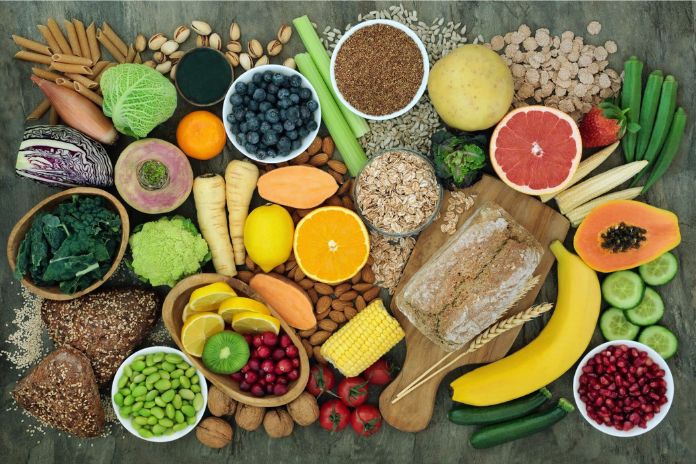Global guidelines recommend daily consumption of around 30 grams for adults. Including foods rich in fiber in the diet is essential not only for intestinal function since they can act as natural laxatives against constipation but also because they are substances that perform a series of useful bodily functions. In particular, fibers, and plant compounds, protect us from numerous pathologies, such as colorectal cancer. So let’s see the different dietary fibers, their properties, and which foods are richest in them.
Fibers: Soluble Or Water Soluble?
Insoluble Fibers
Insoluble fibers are the most useful for the intestine, as by absorbing large quantities of water, they increase the volume of the feces and make them soft, facilitating intestinal transit. “The majority of whole grains, wheat bran, rye bran, rice bran, fruit and vegetables are sources of insoluble fiber,” specifies the doctor.
Soluble Fibers
Conversely, “this fiber tends to slow gastric emptying rather than have a laxative effect.” This happens because soluble fibers create a gelatinous compound inside the intestines. This gel, making the stools viscous, slows down intestinal transit unless this fiber is taken together with abundant liquids. However, it should be remembered that this chelating action of soluble fibers also has positive consequences.
In fact, the gel layer interferes with the correct absorption of macronutrients such as fats and sugars, keeping cholesterol parameters low to benefit cardiovascular health. However, these are not the only functions of the fibers. As we have anticipated, the protective action of these plant compounds is also exciting. Let’s explore this aspect together.
Dietary Fibers: Why Are They Important?
Dietary fibers, which should be consumed with an insoluble/soluble ratio of 3:1, bring various benefits, demonstrated by numerous scientific types of research:
- They have prebiotic effects, enriching intestinal flora with beneficial microorganisms.
- Increase the sense of satiety
- Facilitate intestinal transit
- They strengthen the digestive system, helping to prevent diverticula.
- They reduce the speed and quantity of sugar (and fat) absorption, keeping blood sugar low and reducing LDL levels, so they are recommended in the diet for those with high cholesterol.
- Prevent gastric ulcer and colorectal cancer
- They reduce the assimilation of calories and mutagenic and carcinogenic substances by keeping glycemia and cholesterol low and increasing the sense of satiety. They help prevent obesity and cardiovascular diseases.
Too Much Fiber Is Bad
Of course, consuming foods rich in fiber is important. A diet unbalanced towards bran, fruit and whole foods, perhaps without the correct doses of water (less than two liters a day), as well as the use of fiber supplements in excessive amounts, “can lead to side effects, especially burden on the digestive system.” The main ailments are abdominal swelling, diarrhea, cramps, and meteorism. Among the side effects of fibers, the lousy absorption of some drugs, with which they can interfere, should also be mentioned.
Dietary Fiber Deficiency
Conversely, a low-residue diet, i.e. low in dietary fiber, unless it has been prescribed due to colitis, or chronic inflammatory bowel disease, prevents, for example, from benefiting from the positive effects of whole foods.
In this regard, the interviewee specifies that “the lack of fibers, one of the most widespread forms of malnutrition in industrialized countries, leads to a low fecal mass with consequent problems of intestinal transit, diverticula, cramps, irritation of the intestinal mucosa, hemorrhoids, hypertension, increased oncological and cardiovascular risk.” Having clarified these aspects, we want to tell you which foods are the most fiber-rich. Here is our list.
Fiber-Rich Foods: The List
Among the foods richest in fiber, per 100 grams of product, we find:
- beans
- chickpeas
- Fava beans
- peas
- corn
- lentils
- wheat bran
- durum wheat
- Common wheat
- Pearl barley
- dates
- whole wheat flour
- Rye flour
- soy flour
- oat flour
- oat flakes
- whole meal biscuits
- whole grain bread
- muesli
- fennel seeds
- dark chocolate
- dried hazelnuts
- nuts
- prunes
- pistachios
- roasted peanuts
- almonds
- dry soybeans
- passion flower
- artichokes
- carrots
- eggplant
- beets
- cabbage
- agretti
- raspberries
- Quince
- chestnuts
- avocado
- Kiwi
- Pears.
Also Read: The Nine Good Secrets Of Walnuts

